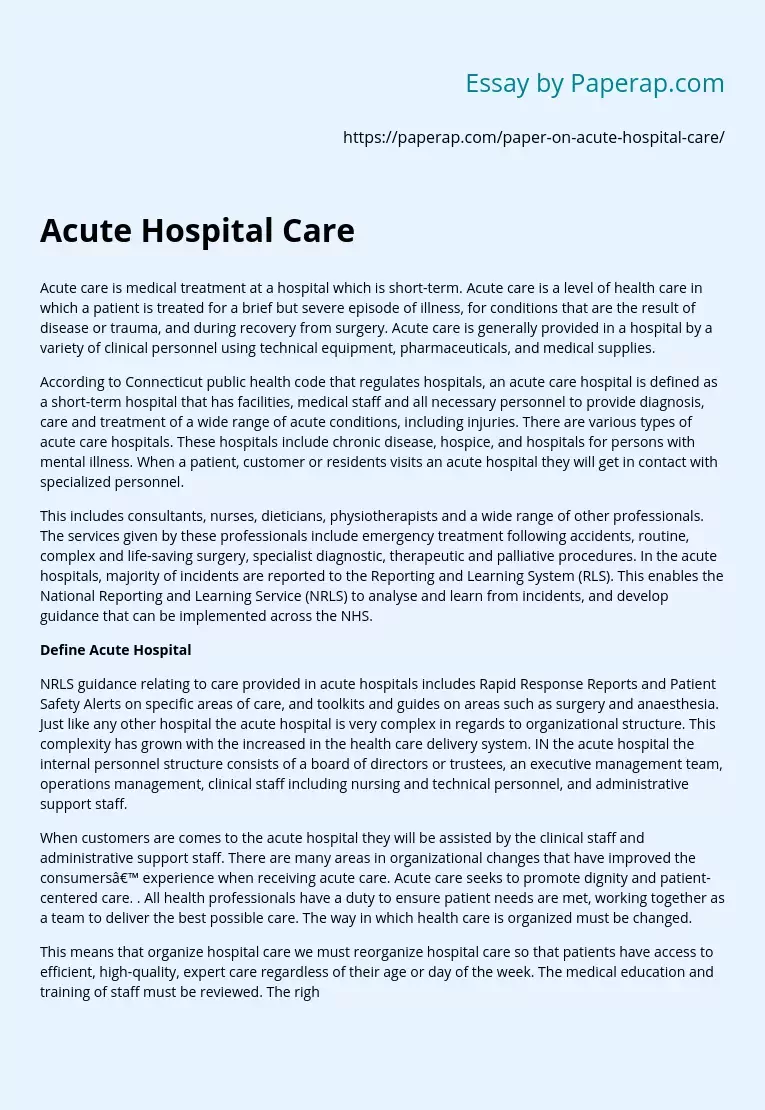Acute Hospital Care
Acute care is medical treatment at a hospital which is short-term. Acute care is a level of health care in which a patient is treated for a brief but severe episode of illness, for conditions that are the result of disease or trauma, and during recovery from surgery. Acute care is generally provided in a hospital by a variety of clinical personnel using technical equipment, pharmaceuticals, and medical supplies.
According to Connecticut public health code that regulates hospitals, an acute care hospital is defined as a short-term hospital that has facilities, medical staff and all necessary personnel to provide diagnosis, care and treatment of a wide range of acute conditions, including injuries.
There are various types of acute care hospitals. These hospitals include chronic disease, hospice, and hospitals for persons with mental illness. When a patient, customer or residents visits an acute hospital they will get in contact with specialized personnel.
This includes consultants, nurses, dieticians, physiotherapists and a wide range of other professionals.
The services given by these professionals include emergency treatment following accidents, routine, complex and life-saving surgery, specialist diagnostic, therapeutic and palliative procedures. In the acute hospitals, majority of incidents are reported to the Reporting and Learning System (RLS). This enables the National Reporting and Learning Service (NRLS) to analyse and learn from incidents, and develop guidance that can be implemented across the NHS.
Define Acute Hospital
NRLS guidance relating to care provided in acute hospitals includes Rapid Response Reports and Patient Safety Alerts on specific areas of care, and toolkits and guides on areas such as surgery and anaesthesia.
Just like any other hospital the acute hospital is very complex in regards to organizational structure. This complexity has grown with the increased in the health care delivery system. IN the acute hospital the internal personnel structure consists of a board of directors or trustees, an executive management team, operations management, clinical staff including nursing and technical personnel, and administrative support staff.
When customers are comes to the acute hospital they will be assisted by the clinical staff and administrative support staff. There are many areas in organizational changes that have improved the consumers’ experience when receiving acute care. Acute care seeks to promote dignity and patient-centered care. . All health professionals have a duty to ensure patient needs are met, working together as a team to deliver the best possible care. The way in which health care is organized must be changed.
This means that organize hospital care we must reorganize hospital care so that patients have access to efficient, high-quality, expert care regardless of their age or day of the week. The medical education and training of staff must be reviewed. The right balance of general and specialist skills must be examined to ensure that the deliver expert, holistic care for current and future patients. Acute hospital must improve the availability of primary care. Care services must be available whenever they are needed, including at the weekend and at night.
Excellent care must be available to patients at all times of the day and night. ” A complete redesign of hospital planning is needed to ensure specialized clinical staffs are available everywhere, 24 hours a day, seven days a week. In these organizations this can lead to a development in the care received at an acute hospital. The greater concern for consumers was the continuity of care. An example in this case is in patients aged 70 and over with multiple health problems.
Those patients are more likely than others to be readmitted to hospital within a short time of discharge and are often moved around in hospital. Another area is holistic and appropriate care for patients. The increase in specialization in medicine has contributed to increasing survival rates for single conditions. However, the breakup of acute care services (eg stroke, acute myocardial infarction, respiratory failure) has removed many consultants from the general medical admitting role and certain specialties(eg neurology, dermatology) effectively provide no junior- or consultant-level staffing for this activity in the majority of hospitals.
Only 19% of consultants reported having a formalized acute team in their hospital. There have been are strain on the increase number of patients who are acutely sick patients. This is due to more people surviving cancer, heart attacks and stroke and lives on into old age. Nearly two-thirds of the patients now being admitted to hospital are over the age of 65 and many are much older.
At night or over the weekend acute hospitals mostly have a junior doctor who may be in their first two years of training as cover. Studies show patient deaths rise by 10% over weekends. In a survey a third of the respondents said their hospital was “average” at delivering high quality of care 24 hours a day, seven days a week and over 10% said it was “poor”. At the acute hospital all patients deserve to receive safe, high-quality, sustainable care centered around their needs and delivered in an appropriate setting by respectful, compassionate, expert health professionals.
Yet it is increasingly clear that our hospitals are struggling to cope with the challenge of an ageing population and increasing hospital admissions. Citation Boseley, S, (2012) Acute hospital care ‘on brink of collapse’ say doctors, The Guardian Hospital Today, Definition and Description of Acute Care Hospital, www. ct. gov/dph/lib/dph/ohca/hospitalstudy/HospToday. pdf Royal College of Physicians, (2012) Hospitals on the edge? The time for action. Tingle, J. (2012). Swings and roundabouts in the quality of care in acute hospitals. British Journal Of Nursing, 21(20), 1230-1231.
Acute Hospital Care. (2019, Dec 05). Retrieved from https://paperap.com/paper-on-acute-hospital-care/

